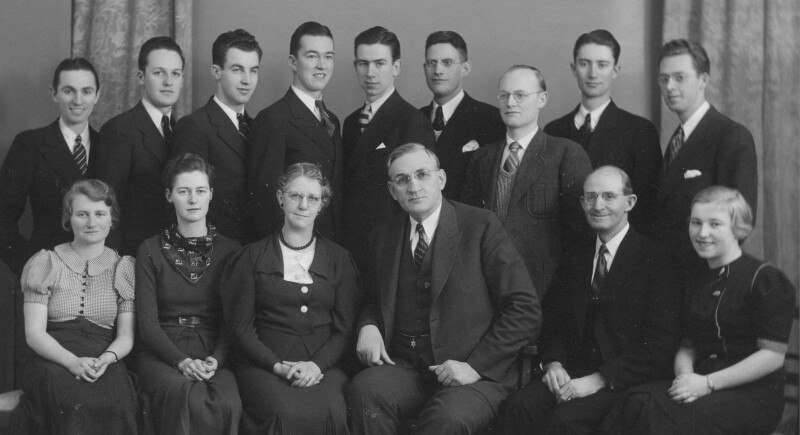We often don’t get to see the impact for good we have based on a decision to notice, help, love, or serve. The outcomes from these experiences are almost impossible to measure because we often feel them in the heart. But even if it seems that an interaction with a loved one or stranger doesn’t matter, we shouldn’t be disheartened.
Camille Fronk Olson, religious scholar and former BYU professor, recently shared, “If you’re thinking to yourself, ‘The Lord doesn’t need me. There are so many others He could use first,’ or if you think your efforts aren’t making a difference, think again.”
Examples from women in the scriptures can help us see that the ripple effects from our Christlike actions, no matter how small, make a lasting difference to strengthen each other and the Lord’s kingdom. “The number of verses about … these women is relatively small in comparison to the length of the scriptures, but their impact for good, and the lessons we can learn from them are profound,” Camille explains. These stories can give us the courage to trust in the Lord as we take on new challenges, assured that He will magnify our efforts.
► You may also like: The important lessons we can learn from 5 mothers in the Old Testament
Learning from Women in the Scriptures
Stories of women in the scriptures provide spiritually vital wisdom for us to learn from today. As Camille points out, “Many women whose stories are recorded in the Old Testament responded to opportunities to serve, lead, testify, and love with faith ... even if they didn’t seem like the most natural or perfect choice.”
For example, Huldah was asked to interpret the meaning of scrolls found during temple construction, even though there would have been higher-ranking men available to do the task. Another illustration is the story of Deborah, who was asked to support the Israelite army and accompany them into battle.
Camille suggests that these accounts are powerful examples of how to act in faith, especially when moving outside our comfort zones:
"When it seemed that no one else was going to ask the question, or testify of truth, or reach out to help, in essence, these women asked themselves, ‘Why not me?’ They can inspire us to do likewise and answer the invitation to step forward in faith.”
We often are prompted or asked to serve even when we feel inadequate or underprepared. When this happens, asking ourselves, “Why not me?” is a way to step forward with faith and trust that God’s mission and plan for us is more expansive than we can imagine.
► You may also like: Abish’s conversion is what every parent wants for their child—the parts of her story your teen should hear again
Trusting the Lord Knows Our Efforts
Among the women in scripture who showed examples of acting in faith are Mahlah, Tirzah, Hoglah, Noah, and Milcah. More often known collectively as the five daughters of Zelophehad, their decision to ask “Why not us?” influenced a law that still has an impact today, teaching us how to advocate for change.
When it came time for the children of Israel to enter the promised land, it was determined that the land would be divided evenly between the twelve tribes. Camille explains that the land would then “be subdivided and a parcel given as an inheritance to each of the sons of the faithful Israelite men in the name of their fathers so that those names would never be forgotten.”
The five daughters of Zelophehad knew their father was among the faithful, but he didn’t have any sons. Not only would these sisters be left out of receiving a land inheritance, but their father’s name also would be lost.
Even though “they were almost assuredly very young” because none were married, as Camille suggests, they did not let their circumstances deter them from petitioning the Lord through His prophet. Rather than stirring up contention for the unfairness of their situation, these daughters sought out a way to make sure they were heard by the Lord.
Camille explains that the daughters of Zelophehad “focused their petition to obtain legislation that would protect the memory of faithful Israelite families that lacked male descendants. ... The girls desired to expand the law to allow their father’s name to be remembered along with all the other faithful fathers.”
Because of their request, we learn in Numbers 27:5 that “Moses took their cause before the Lord.”
There was no way for these five young women to know the outcome of bringing their question to Moses. Perhaps the conversations between them were filled with doubt, worry, or uncertainty because of their status. However, their desire to create equality and point out the unfairness in the land division outweighed what might have prevented them from making their request.
Their faith led to greater revelation, as the Lord directed Moses:
“The daughters of Zelophehad speak right: thou shalt surely give them a possession of an inheritance among their father’s brethren; and thou shalt cause the inheritance of their father to pass unto them” (Numbers 27:6–7).
Through five fatherless young women—Tirzah, Milcah, Hoglah, Mahlah, and Noah—the law was changed so that women could also inherit. Their request was personal, but this small action created an enduring impact for all of the Israelites.
► You may also like: 7 unexpected lessons I learned from Ruth and Naomi
The Lasting Impact of Small Actions
The ripple effects of the good we try to do can be more far-reaching than we ever realize.
“The legal decision inspired by Zelophehad’s daughters has directly influenced women’s inheritance rights in Judeo-Christian nations today,” Camille says. “One legal scholar observed that this ancient Israelite law that was changed after Moses inquired of the Lord about the girls’ circumstance is ‘the oldest decided case that is still cited as an authority’ (Clark, “Zelophehad,” 133). In other words, the law these girls influenced has blessed the world for some 2,500 years.”
When we think of our own lives, it may be difficult to imagine making an impact that still reverberates thousands of years later. But when we consider spiritual legacies, this possibility might be easier to understand.
Personally, I don’t look at my life as one that will have an enduring legacy. But then, I think of my paternal grandmother, who joined the church as a young woman in Germany and then immigrated to the United States on the eve of World War II. She will not be written in history books. But the spiritual strength she showed by deciding to be baptized and then living a life of quiet faith continues to branch out through our family.

Her only son, my dad, served a mission. Four of her six grandchildren served missions. She died before seeing any of her 24 great-grandchildren serve missions, but five have already. There is no way to measure or record this kind of impact for good that began when my grandma chose to follow Christ, but her faith continues to influence generations.
Just as my grandma’s story encourages me, Camille suggests that we can find personal inspiration from the stories of women in the scriptures:
“When we read the stories of these women with the question in mind of, ‘Why not me?’ we find the inspiration to ask this of ourselves and move forward with greater faith that God not only is using us for good, but that He needs us, and loves us, and knows each of us personally.”
Most likely, we won’t know the far-reaching effects our small, deliberate, faithful actions accomplish, but the Lord does. When called and prompted, we can ask ourselves, “Why not me?” and the Lord, who knows when each sparrow falls, will remember.
Learn more from Camille about lessons from women in the scriptures in her Seek course and from her books, Women of the Old Testament and Women of the New Testament.
► You may also like: Did you catch the inspiring examples of the 20 faithful women who labored with Paul?


